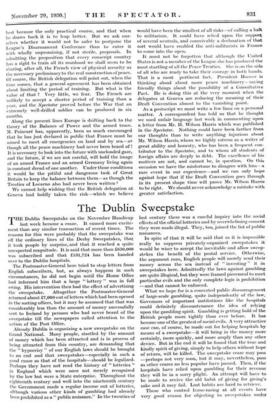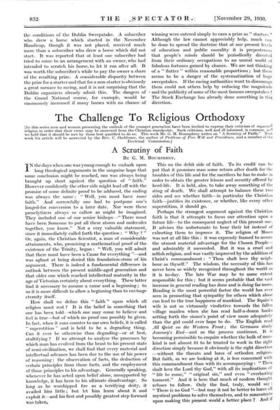The Dublin Sweepstake
THE Dublin Sweepstake on the November Handicap
last -week became a craze. It caused more excite- ment than any similar transaction of recent times. The reasons for this were probably that the sweepstake was off the ordinary lines of the Derby Sweepstakes, that it took people by surprise, and that it reached a quite unexpected magnitude. It is said that more than /650,000 was subscribed and that £181,724 has been handed over to the Dublin hospitals.
The Postmaster-General here tried to stop letters from English subscribers, but, as always happens in such circumstances, he did not begin until the Home Office had informed him that a large " lottery " was in full swing. His intervention then had the effect of advertising the sweepstake. Altogether the Postmaster-General returned about £7,000 out of letters which had been opened in the sorting offices, but it may be assumed that that was considerably less than the amount of money successfully sent to Ireland by persons who had never heard of the sweepstake till the newspapers called attention to the action of the Post Office.
Already Dublin is organizing a new sweepstake on the Grand National. Many people, startled by the amount of money 'which has been attracted and is in process of being attracted from this country, are demanding that the " hypocrisy " of our English laws should be brought to an end and that sweepstakes—especially in such a good cause as that of the hospitals—should be legalized. Perhaps they have not read the history of " lotteries " in England which were once not merely recognized by the law but were a State enterprise. Throughout the eighteenth century and well into the nineteenth century the Government made a regular income out of lotteries, although various other kinds of gambling had already been prohibited as a "'public nuisance." In the twenties of
last century there was a careful inquiry into the social effects of the official lotteries and by overwhelming consent they were made illegal. They, too, joined the list of public nuisances.
In spite of that it will be said that as it is impos.sible really to suppress privately-organized sweepstakes it would be wiser to accept the inevitable and allow sweep- ste kes the benefit of the postal service. Otherwise, the argument runs, English people will merely send their money across the sea instead of " investing " it in sweepstakes here. Admittedly the laws against gambling are quite illogical, but they were framed piecemeal to meet particular evils and the only complete logic is prohibition —and that cannot be enforced.
What we hope for is a concerted public discouragement of large-scale gambling, quite independently of the law. Governors of important institutions like the hospitals could definitely discountenance the idea of relying upon the gambling spirit. Gambling is getting hold of the British people more tightly than ever before. It has become one of the greatest of social evils. A very attractive case can, of course, be made out for helping hospitals by means of a sweepstake—it will bring in the money more certainly, more quickly, and more amply than any other device. But in the end it will be found that the true and kindly spirit of giving, simply to help others without hope of return, will be killed. The sweepstake craze may pass —perhaps not very soon, but it may, nevertheless, pass as other crazes no less popular have passed. Then, if the hospitals have relied upon gambling for their revenue they will be in a sorry plight. An attempt will have to be made to revive the old habit of giving for giving's sake and it may fail. Lost habits are hard to retrieve.
Those who control horse-racing at all events have very good reason for objecting to sweepstakes under
the conditions of the Dublin Sweepstake. A subscriber who drew a horse which started in the November Handicap, though it was not placed, received much more than a subscriber who drew a horse which did not start. It was reported that at least one subscriber had tried to come to an arrangement with an owner, who had intended to scratch his horse, to let it run after all. It was worth the subscriber's while to pay the owner a share of the resulting prize. A considerable disparity between the prize for a starter and that for a non-starter is obviously a great menace to racing, and it is not surprising that the Dublin organizers already admit this. The dangers of the Grand National course, for example, would be enormously increased if many horses with no chance of winning were entered simply to earn a prize as " starters." Although the law cannot appreciably help, much can be done to spread the doctrine that at our present levels of education and public morality it is preposterous that . people's minds should be periodically diverted from their ordinary occupations to an unreal world of fabulous fortunes gained by chance. We are not thinking of a " flutter " within reasonable proportions ; but there seems to be a danger of the systematization of huge sweepstakes. If the racing authorities want to discourage them could not others help by reducing the magnitude • and the publicity of some of the most famous sweepstakes ? The Stock Exchange has already done something in this direction.











































 Previous page
Previous page